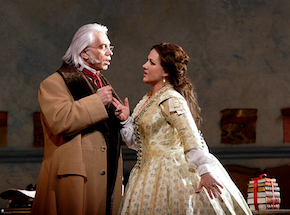
I used the subject line "A survey I'd prefer not to believe" in a message to the Opera-L forum that linked to a surprising and stunning report from the UK, concluding: "Opera screenings failing to boost interest in the art form, survey finds."
Around 85% of audiences that attend live screenings of opera do not feel more compelled to see the art form live afterwards, according to a new survey.The investigation found that, after seeing an opera at the cinema, around 75% of participants reported feeling no different about attending a live production, with around 10% feeling less motivated.
This has shown that screening opera productions to create a new generation of audience for the live art form is "wishful thinking," according to English Touring Opera’s general director James Conway.
The survey included responses from around 230 participants who were almost all attending cinemas in London at the end of 2013 to watch live relays of operas Eugene Onegin, The Nose, Sicilian Vespers, Tosca and Falstaff.
Surveying 230 of the millions of Live HD patrons of the Met, the Royal Opera, and other companies is obviously an extremely small sample, but there are some significant aspects of the subject. (The Met alone has sold 15 million tickets in 64 countries since beginning live-to-cinema broadcasts at the end of 2006.)
Conclusions of the London survey brings to mind NFL owners' initial objections to televising football games that it would "empty stadiums." The billion-dollar record of both live and televised games over the years quickly belied that fear, even if the 2007 high of 17 million live attendance declined to 16 million per season in the past couple of years. Combined revenue is at $9 billion annually, with a much higher figure predicted/hoped-for.
Responses from Opera-L mostly agreed with my skepticism, but also introduced other thoughts. At first, La Cieca of Parterre Box wrote:
There's an assumption here that HD cinema presentations are intended to "build the audience" for live opera, and I don't know that this was ever a stated objective. What the HD does very definitely do, and does very well, is to extend the reach of the Met's performances, i.e., the number of people who get to see and hear the Met's productions. The maximum number of seats that can be sold to performances in the Met auditorium is about 800,000 per year, and the HD plays to about 3 million per year. In other words, the HD increases the Met's reach by about 400%. And — this is the amazing part — the Met actually makes money while increasing its reach so significantly.
I responded that "building audiences" and "extending reach" sound very similar, and even if the survey shows no intent to attend live performances, all those tushes are occupying seats at opera. La Cieca again:
I think there's going to be an audience for each tier, with some small amount of crossover. To hear and see a complete opera only 20 minutes from your home, on a Saturday afternoon, without having to get dressed up, and from seats that are frankly vastly more comfortable than opera house seats, all for $20 — that is an attractive proposition, especially for people who probably wouldn't go to the opera anyway.
From the UK, Lucia Stefan wrote:
As a Londoner attending both cinema and live opera I would advise to take this study with a pinch of salt. The survey relates to the very specific circumstances of London.I noticed too that cinema viewers tend to be much older than the people I normally see at the Royal Opera House or the English National Opera.
One explanation could be the cost of tickets, very high at the ROH, a deterrent for older people living on small pensions or for people with average incomes. Adding the expensive parking space in the Covent Garden area, and the difficulty of returning home by public transport if the performance ends very late is another deterrent. Opera at the cinema is the closest to opera these people can realistically afford.
At the other end, very young people will shun opera if they did not attend regularly opera performances with their parents. In Romania, my country of birth, families tend to take their children at opera performances, a tradition still very much alive in Eastern and Central Europe. I started attending opera performances at the age of nine and 45 years down the line I still go to opera.
The high price for a decent opera ticket in the U.S. is a bigger enemy than cinema. In Germany, the public is much younger, including couples with children, simply because tickets are affordable, courtesy of the high subsidies German opera houses receive.

